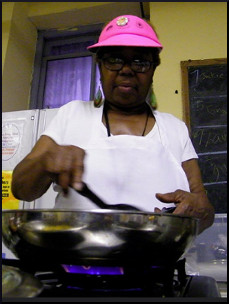
Thanksgiving greetings to all the volunteers and donors who provide holiday dinners for people experiencing homelessness. We also honor those who attend to the nutritional needs of the homeless throughout the year through a variety of programs.
Not long ago, Fox News carried an article written by Rabbi Abraham Cooper about activist Jay Goldinger:
For the last 805 Sundays, he and a small cadre of volunteers have stood on the frontline of Los Angeles’ forgotten jobless and homeless population and delivered change we can truly believe in. Goldinger’s initiative called ‘Food on Foot’ does not merely give out food and clothing to the down and out but has helped turn many of them into productive taxpayers.
The method is described as a tough-love approach. The author relates how Goldinger will give a new participant a mirror and say,
Take a good in the mirror. You are looking at the enemy; the only person holding you back from a bright future.
There’s nothing wrong with telling people that. It’s what plenty of sages have told us, from Gautama Buddha to Sigmund Freud to Werner Erhard. Of course, technically, it’s only true some of the time. There are other things that can hold a person back.
Richard R. Troxell enumerates some of those things:
However, it perpetuates the stereotype that people experiencing homelessness are drug addicts. Let’s just suppose that if it were true, it does not change the fact that after they go about looking into that mirror and ‘turning their lives around,’ they will be returned to a world that pays them ‘slave wages’ that are so little, it prevents their escape from poverty.
And what if we consider for just a moment that it may well have been those ‘slave wages’ that caused them to lose hope, and cause them to turn to drug use, and possibly drug sales as their only escape for their situation? And what is the criminal charge for the Federal Government that created the ‘slave wage’ standard that drove them to using drugs and selling drugs in the first place?
And what about the employer who surrendered his ethical standard to a non-living, non-feeling, non-thinking, non-human institution? What criminal charge is there for the employer who is a real-life human being who hides behind this ‘thing’ and takes a worker’s wage for less an amount that affords him a roof over his head… other than a bridge?
Where is the righteous indignation? How can we expect to change the way the world looks at this if we don’t promote it like a steady drum beat?
At any rate, the purpose of the “Food on Foot” program is to motivate the participants to take responsibility for their actions. Actually, that’s an excellent principle for all of us to follow, and many would approve the fact that the program has never taken any funding derived from taxes.
Cooper goes on to say,
Backsliding is never rewarded. And there is another key component. Jay demands of everyone — random acts of kindness — like sharing some food, guiding a blind person across the street, helping an elderly person with their shopping… These simple acts challenge people clinging to the lowest rung of society to validate their self-worth and to realize that victimhood isn’t a coat that protects you from the elements but a straitjacket that locks you in to a cycle of misery.
Obviously, this is not a program for everyone. But for those who apply and are accepted, the success rate is said to be 89%. If that impressive claim is accurate, it’s a program that needs to be replicated.
In Seattle, Washington, they have FareStart, a nonprofit organization that has been training at-risk kids to work in the food industry, not as counter help but as actual chefs. Thanks to FareStart and the network it inspired, Catalyst Kitchens, a lot of homeless lives have turned around since 1992.
Associated Press reporter Gene Johnson lists the three goals pursued by these entities:
… feeding hungry people, providing housing and other support to those on the margins of society, and giving people the skills they need to lift themselves out of poverty.
Johnson interviewed some of the participants who are trying out new ways of interacting with society, like being on time, and being sober on the job, or at any point during the day. Some have been through anger management therapy and other self-improvement programs, and it appears that the overwhelming majority of students flourish and go on to brighter futures.
He also interviewed a staff chef, Sam Clinton, who was once a successful and well-compensated professional, until he became a homeless addict. And this quotation from Clinton is one of the most profound things ever said:
If you want to be sober, you need to be with people who want to be sober.
Reactions?
Source: “Could LA’s Jay Goldinger Hold the Key to Defeating Homelessness?,” Fox News, 08/20/11
Source: “Seattle program teaches homeless to feed hungry,” The Washington Times, 09/04/11
Image by Vadim Lavrusik, used under its Creative Commons license.


